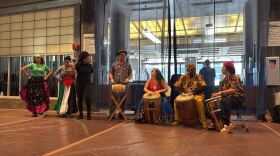. Our top story on Midday edition the California Supreme Court has ruled against San Diego's Proposition B Prop B eliminated guaranteed pensions for all newly hired city workers except police offering instead a 401k style retirement plan. It was approved by more than 65 percent of voters back in June 2012. But the legality of the way the city handled Prop B has been knocking around in the legal system for years. And today in a unanimous ruling the state high court ruled the pension reform measure was illegally placed on the ballot. Joining me is legal analyst San Diego attorney Dan Eaton. Dan welcome. Sure. Thank you Maureen. The essential question at the heart of this legal challenge was whether then Mayor Jerry Sanders should have fulfilled his obligation to meet and confer with labor unions about the proposed change in employee benefits. So what do the court have to say about that. Let's talk about what it means. It's a term of art and it means negotiate with the unions before you reach and this is what the statute says quote arriving at a determination of policy or course of action close quote concerning the wages or terms conditions of employment that applies both to governing agencies namely the city council or its designated representative. Now Mayor Sanders at the time as mayor was the chief bargaining negotiator. But Chief bargain negotiation neuter for a collective bargaining and the court said look if you're going to push a citizens initiative and you're going to use all of the powers that come with being a mayor and use that as a basis for pushing for it you've got to meet and confer it was clear you were going to push this a final decision was made. We don't know exactly when your duty to meet and confer kicked in said the California Supreme Court. But at minimum it kicked in when the union demanded that you do so. You didn't. You rebuffed all of those things the process was tainted. It goes back to the Court of Appeal to decide what happens next with Proposition B. There was another question that the Supreme Court looked at and that was to what degree of deference courts should give to Perth. That's the Public Employment Relations Board. Herb had ruled that Prop B should be overturned. But then the appeals court decided not to take perves decision into consideration at all when it looked at the case. What did the justices have to say on that point was technically probe did not invalidate what it said was that you've got to treat Proposition B as though it was never enacted because said didn't have the power to invalidate the statute which is only for a court. But the bottom line is California Supreme Court said look the court of appeal here in San Diego did not defer enough to the findings of perh because labor relations is really within its particular expertise and purpose interpreting the mires million Brown Act which is the Meekin which is where the meet and confer obligation Collins said the mayor violated his obligation and the court of appeal notwithstanding the fact that judges ultimately decide whether laws are properly interpreted or not should have deferred more to perp's interpretation. And it's finding that Mayor Sanders violated his duty to meet and confer. How significant is this ruling. Oh I think it's very significant. When you look at the fact that you're looking about municipalities and states across this country who are dealing with pension crisis which is what the mayor not inaptly called the situation we were facing in 2012 it's serious. You could have a serious effect on the city's FISC if Proposition B ultimately is invalidated. When the Court of Appeal gets a chance to look at it so it could have a significant it could have a significant effect on the city's aeroshell but more importantly as far as a court of California's record is concerned the employee's rights have to be respected to their right to be involved in this process of deciding what happens to such an important benefit pensions in viewing the oral argument in this case. You kind of expected this outcome. And your dad wasn't kind of expected. I definitely expected it. I looked at it in real time and appeared on air to talk about it. I looked at it again last night and I said Wow. The Court of Appeal is upset. They're going to they're going to take action. They don't like the way the mayor handled this and they are going to say that this process was tainted. Now the interesting question was what the remedy would be would they invalidate Proposition B or what would they do and what they said was we're sending it back to the Court of Appeal to look at whether the mayor's violation of his meeting confer obligation requires that Proposition B be invalid or some other kind of remedy. Interestingly the Court of the Supreme Court specifically said it was not taking a position on pension reform nor was it asked to do so. So when the Court of Appeal gets this case back what specifically is going to be looking at. It's going to specifically look out. There is a violation that they can't look at that again the court of appeals of the California Supreme Court said of appeal you were wrong on that. They're going to say what is the remedy for that. And the city may argue well it's no harm no foul as you said in the opening it was enacted it was passed by over 65 percent of the voters and therefore it was a truce. It was a true initiative although it could say it's got to be thrown out. In light of this taint in the process it cannot stand. And therefore we go back to these new employees being entitled to full pension benefits and with the consequent effect that that will have on the city's treasury. What is at stake here. You were just saying it's not just economic but it's it's the it's really sort of the concept and what cities can do in order to rein in pension costs. Yes that's exactly right. What the city can do to rein in pension costs look there was no dispute there was no dispute. Oral argument. There's no dispute in the court's opinion today that a citizen initiative properly enacted can address pension reform. The problem was with the way this went about they said Mayor Sanders overstepped its bounds used his official position to push this. But the fact is that this is not going to be the last word in this either in pension reform or in this you have in this opinion. The Court of Appeal weighing in and ultimately you may very well have an initiative that will not have the taint that the California Supreme Court identified that this one does. And you say this is perhaps not the final time that the state Supreme Court will get this case it won't be the final time. I suspect that whatever the court of appeal does whether it sides with the city or the union as to what should happen next. They're going to take a look at all of the justices I watched the oral argument twice are concerned about those and they are going to want to keep a close eye on it. I've been speaking with the attorney Danny and partner with Selsor Kaplan McMann and. Dan thank you. Thank you Maureen. The switch to renewable energy sources may be very good for California in the long run but there may be some bumps along the way. California's power grid has been designed for traditional forms of energy and relying on renewables poses challenges. A new report looks at the impact alternative energy programs will have on California's power grid. The analysis was made by researchers from the UCLA Luskin center for innovation. Joining me is Jay R. DeShazo director of the Luskin Center and co-author of the report. And welcome to the program. Thank you very much for having me.
The state Supreme Court Thursday ruled that a San Diego citizens' initiative that cut back city employee pensions was illegally placed on the ballot, and ordered an appeal court to consider a remedy.
Proposition B, initially approved by voters in 2012, eliminated guaranteed pensions for new city employees, except police officers, and replaced those benefits with 401(k)-style retirement plans.
In 2015, one of the city's largest public sector unions challenged the benefit system, alleging former Mayor Jerry Sanders and other officials illegally placed the measure on the ballot without conferring with labor groups. The Public Employees Relations Board ruled with the union, but the state's Fourth District Court of Appeal reversed the decision in April 2017.
RELATED: California Supreme Court Hears Arguments In Prop B Pension Case
Now, the appeal court's decision is overturned.
"We reverse the Court of Appeal's judgment and remand for further proceedings to resolve issues beyond the scope of this opinion," wrote Associate Justice Carol A. Corrigan in Thursday's decision, in agreement with the other five justices.
In a statement, San Diego Mayor Kevin Faulconer, who supported pension overhaul as a city councilman, said the court's decision doesn't change the fact that more than 65 percent of voters supported the initiative.
"My administration will work closely with the city attorney's office on the direction provided by the Supreme Court. The public mandate for reform is as valid now as it was when Proposition B passed in 2012, and I will insist that taxpayers continue to be protected as we move forward," he said.
Statement from President and CEO Jerry Sanders regarding today’s California Supreme Court ruling on Proposition B, the pension reform measure: pic.twitter.com/sJ4GPsOEtN
— San Diego Chamber (@SDChamber) August 2, 2018
The court ruled that although it was a citizens' initiative, Sanders' support of Prob B as policy warranted engagement with the unions under the Meyers-Milias-Brown Act, which gave city and county employees the right to collective bargaining in 1968.
Governing bodies "or other representatives as may be properly designated" need to engage with unions "prior to arriving at a determination of policy or course of action," according to the act.
Sanders had previously said he supported the measure as a private citizen, not a public employee. The Supreme Court ruled that Sanders did use the power of his office to push the initiative, however.
"He consistently invoked his position as mayor and used city resources and employees to draft, promote and support the Initiative. The city's assertion that his support was merely that of a private citizen does not withstand objective scrutiny," Corrigan wrote.
RELATED: Appeals Court Upholds Proposition B
In a statement, Sanders, now president and CEO of the San Diego Regional Chamber of Commerce, said further court action will be closely observed.
"Proposition B has been a resounding success that has allowed the city to reinvest in neighborhood services and public safety. It was critical to turning around the city's finances at a time when the City was facing massive deficits, devastating cuts to core city services and downgrades in the city's bond rating," he said.
In overturning the Public Employees Relations Board ruling in 2017, the appeal court took an "unduly constricted view of the duty to meet and confer," according to the Supreme Court ruling.
The Supreme Court ruled that the appeal court address an "appropriate judicial remedy" for the illegal placement of the initiative on the ballot.
The Public Employees Relations Board had previously ruled the city must pay employees "for all lost compensation" related to lost pension benefits, which would cost millions of dollars.






